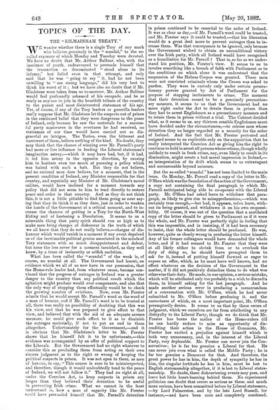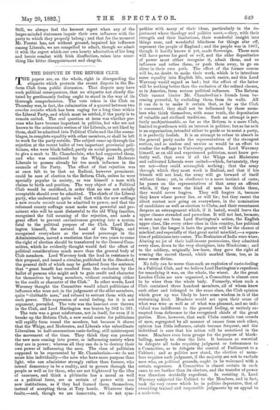TOPICS OF THE DAY.
THE " KILMAINHAM TREATY."
WE wonder whether there is a single Tory of any mark who believes genuinely in the " scandal," to the so- called exposure of which Monday and Tuesday were devoted. We have no doubt that Mr. Arthur Balfour, who, with the insolence of youth, endeavoured to persuade himself that the transaction so denominated " stood alone in its infamy," but failed even in that attempt, and only said that he was " going to say " it, had he not been unwilling to " use strong language," did his very best to think his worst of it ; but we have also no doubt that if Mr. Gladstone were taken from us to-morrow, Mr. Arthur Balfour would feel profoundly ashamed of his escapade, and be as ready as any one to join in the heartfelt tribute of the country to the purest and most disinterested statesman of his age. Yet, of course, if any of the Tory leaders or guerrilla leaders really suppose that Mr. Gladstone let the suspects out of prison in the continued belief that they were dangerous to the peace of Ireland, only because he saw the materials for a success- ful party manoeuvre in the overtures he had received, no statesman of our time would have carried out so dis- graceful an intrigue. The Tories, even the bitterest and narrowest of them, believe nothing of the kind. No doubt, they may think that the chance of winning over Mr. Parnell's party had more or less influence in leading the Liberal statesman's imagination astray,—which it may have had, but, if it had, it led him astray in the opposite direction, by causing him to hesitate even too much at pursuing a policy which was baited with such a bait. But they do not believe, and no rational man does believe, for a moment, that in the present condition of Ireland, any Minister responsible for that country, and especially any Minister of Mr. Gladstone's moral calibre, would have inclined for a moment .towards any policy that did not seem to him to tend directly to restore peace and order in that country. And as they do not think this, it is not a little pitiable to find them going as near say- ing that they do think it as they dare, just in order to weaken the hands of the Government at a critical moment, and to in- crease the chances of getting in a Tory for the North-West Riding and of hastening a Dissolution. It seems to us a miserable .thing that party spirit should run so high as to make men bring charges of dishonour in the truth of which we all know that they do not really believe,—charges of dis- honour which would vanish in a moment if any event deprived us of the inestimable political genius associated in the minds of Tory statesmen with so much disappointment and defeat, but none the less never for a moment tarnished, as they well know, by a trace of insincerity or selfish ambition.
What has been called the " scandal" of the week is, of course, no scandal at all. The Government had learnt, on evidence which we all of us now have in our possession, that the Home-role leader had, from whatever cause, become con- vinced that the progress of outrages in Ireland was a greater danger to the country than any political result which the agitation might produce would ever compensate, and also that the only way of stopping them effectually would be to check the growing number of evictions. Now, even Mr. Forster admits that he would accept Mr. Parnell's word as the word of a man of honour, and if Mr. Parnell's word is to be trusted at all, there was really no possibility of doubting that this was his view, and that he was prepared to give effect to that view, and believed that with the aid of an adequate arrears measure, he could give such effect to it as to diminish the outrages materially, if not to put an end to them altogether. Unfortunately for the Government,—and it is obvious that Mr. Gladstone's letter to Mr. Forster shows that he himself felt it to be unfortunate,—this evidence was accompanied by an offer of political support to the Liberals. But the Government had no right whatever to consider this as precluding them from acting on their own sincere judgment as to the right or wrong of keeping the political suspects in prison. It was not open to them, as men of honour, to say, " This course is sure to be misinterpreted, and therefore, though it would undoubtedly tend to the peace of Ireland, we will not follow it." They had no right at all, under the Coercion Act, to keep suspects in prison any longer than they believed their detention to be useful in preventing Irish crime. What we cannot in the least understand is, how a man of sagacity like Mr. Forster could have persuaded himself that Mr. Parnell's detention in prison continued to be essential to the order of Ireland. It was as clear as day,—if Mr. Parnell's word could be trusted, and Mr. Forster says it could be trusted,—that his liberation would do a great deal more to prevent outrages than to in- crease them. Was that consequence to be ignored, only because the Government wished to obtain an unconditional victory over the Irish party, which all Ireland would have recognised as a humiliation for Mr. Parnell ? That is, so far as we under- stand his position, Mr. Forster's view. It seems to us to involve something like a breach of faith with Parliament as to the conditions on which alone it was understood that the suspension of the Habeas Corpus was granted. These men were not convicted criminals whom the Crown was asked to pardon. They were in custody only under certain precau- tionary powers granted by Act of Parliament for the purpose of stopping incitements to crime. The moment that their detention ceased to be a genuinely precaution- ary measure, it seems to us that the Government had no more right under the Act to detain them in prison than they had to arrest Englishmen as a precautionary measure and to retain them in prison without a trial. The Cabinet decided what, as it seems to us, any thirteen sensible Englishmen must have decided under the circumstances,—to release men whose detention they no longer regarded as a security for the order of Ireland. And the fact that Mr. Forster protested and resigned seems to us explicable only on the supposition that he really interpreted the Coercion Act as giving him the right to continue to hold in arrest all persons whose release, though wholly unlikely to result in fresh crime, nay, even likely to result in its diminution, might create a bad moral impression in Ireland,— an interpretation of its drift which seems to us extravagant and unreasonable beyond measure.
But the so-called "scandal" has not been limited to the main issue. On Monday, Mr. Parnell read a copy of the letter to Mr. O'Shea which was the foundation of the action of the Government, a copy not containing the final paragraph in which Mr. Parnell anticipated being able to co-operate with the Liberal party. Mr. O'Shea had asked leave to withdraw that para- graph, as likely to give rise to misapprehensions,—which was certainly true enough,—but had, it appears, taken leave, with- out its being granted, and withdrawn it on his own responsi- bility. Of course, it was out of the question that a mutilated copy of the letter should be given to Parliament as if it were the whole, and Mr. Forster was perfectly right in feeling that this was impossible, and in insisting, if it had been necessary to insist, that the whole letter should be produced. He was, however, quite as clearly wrong in producing the letter himself. Any of his former colleagues would have demanded the whole letter, and if it had seemed to Mr. Focster that they were at all likely either to shrink from or to overlook the duty of doing so, he should have prompted them to ask for it, instead of putting himself forward as eager to expose an offer, which, as he must have well known, had no effect whatever on the decision of the Government in the matter, if it did not positively disincline them to do what was otherwise their duty. He made, in our opinion, a serious mistake, which will be attributed only too probably to a wish to discredit them, in himself asking for the last paragraph. And he made another serious error in producing a memorandum of a conversation with Mr. O'Shea, which he had never submitted to Mr. O'Shea before producing it, and the correctness of which, on a most important point, Mr. O'Shea. peremptorily denies. It seems to us that by these errors of judgment, which we ourselves are far from attributing to any disloyalty to the Liberal Party, though we do think that Mr. Forster has borne the malice of the Home-rulers till he can hardly endure to miss an opportunity of dis- crediting their action in the House of Commons, Mr. Forster has excited a prejudice against himself which is both very unnecessary, and, in the interest of the Liberal Party, very deplorable. Mr. Forster can never join the Con- servatives; he is far too genuine a Liberal for that. He can never join even what is called the Middle Party ; he is far too genuine a Democrat for that. And therefore, the great power he has in him, the depth of sympathy he has in him, the singular fortitude he has in him, must be lost to English statemanship altogether, if it is lost to Liberal states- manship. No doubt, these disheartening events may pass, and leave but little heart-burning behind them. No experienced politician can doubt that errors as serious as these, and much more serious, have been committed before by Liberal statesmen, —by Lord Palmerston, and by the late Lord Russell, for instance,—and have been soon and completely condoned.
Still, we always feel the keenest regret when any of the larger-minded statesmen impair their own influence with the party to which they properly belong ; and that for the moment Mr. Forster has, not without ground, impaired his influence among Liberals, we are compelled to admit, though we admit it with the regret which our own hearty admiration of his long and heroic combat witli Irish disaffection, raises into some- thing like bitter disappointment and chagi in.

































 Previous page
Previous page